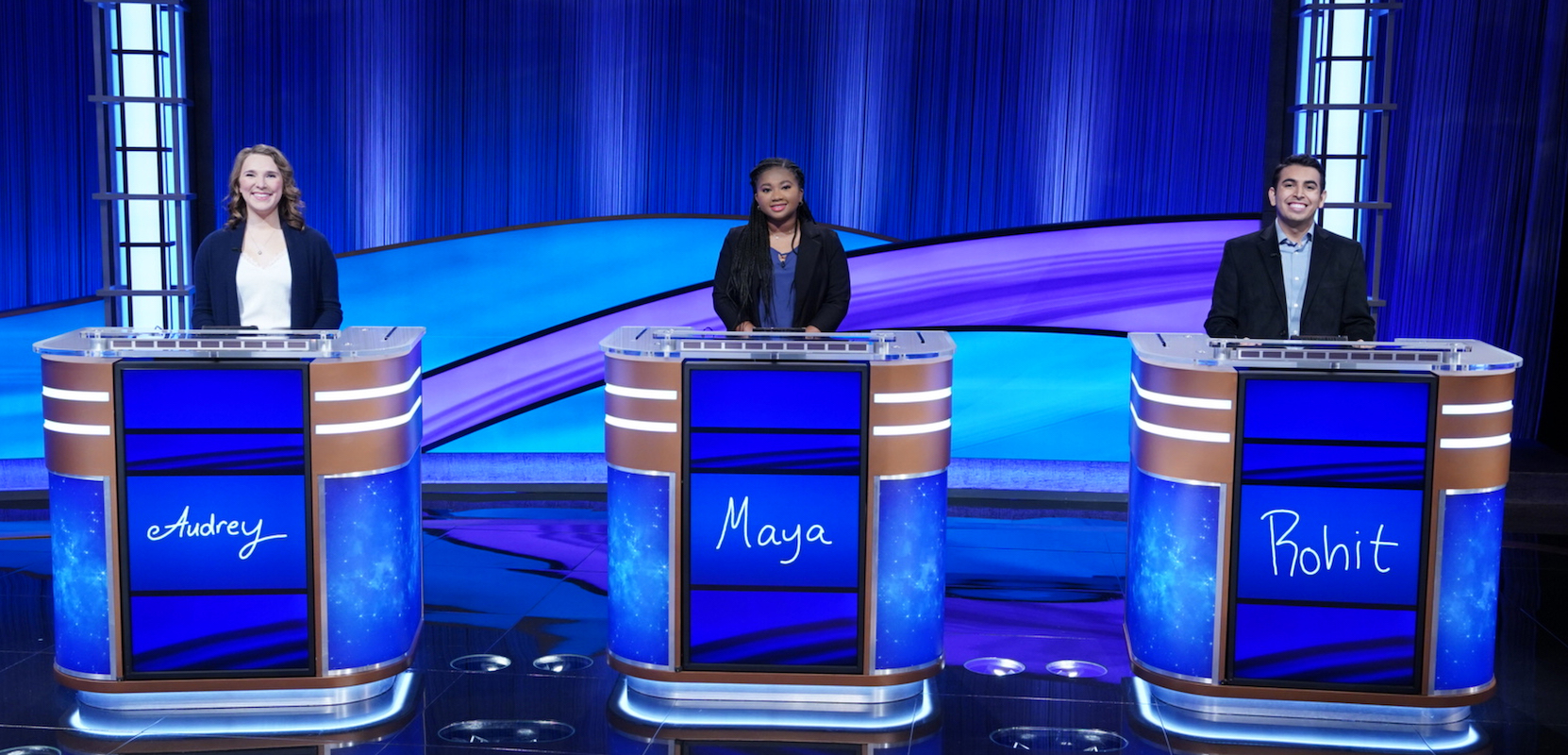Editor’s note: Emory senior Maya Wright reached the final rounds of the “Jeopardy! High School Reunion” tournament and finished in third place.
On weekday evenings, watching “Jeopardy!” was routine in senior Maya Wright’s childhood home. She dreamt of being on the show and has been participating in academic bowls since the fifth grade. In 2018, her dream came true, and she placed third in “Jeopardy! High School Tournament.” Now, Wright has another chance to vie for first place on the new “Jeopardy! High School Reunion Tournament,” which is set to air Feb. 20–March 9. She will make her first appearance on Feb. 20.
Wright — who is a human health and Spanish double-major and president of the Emory Quiz Bowl team — will join 26 former teen contestants who are currently undergraduates or recent college graduates. The “High School Reunion Tournament” consists of nine quarterfinal games, three semifinals and a two-day, total-point-affair final. They will compete for the chance to win a $100,000 grand prize and a spot in the Tournament of Champions.
It’s a unique opportunity, given that Wright is the only student from Emory appearing in the tournament and one of two attending college in Georgia. (The other is Sreekar Madabushi, a junior at Georgia Institute of Technology.)
On Feb. 20, Wright will face off against Rohit Kataria, a junior at Vanderbilt University in Nashville, Tennessee, and Audrey Sarin, a senior at Cal Poly University-San Luis Obispo. Check local listings for show times and stations.
Here, Wright talks about preparing for competition, getting ready to graduate and what “Jeopardy!” means to her.
How did you carve out time to prepare for “Jeopardy!” while also balancing your class work?
For a solid two months, all I watched were “Jeopardy!” episodes and any educational content such as the series “Explained” and a lot of “Crash Course with John Green.” Whenever I couldn’t be in front of a screen, I listened to educational podcasts. I really like Ologies with Alie Ward and the Stuff You Missed in History Class podcast. With time, the recall comes back with practice. I make rhymes or acronyms to remember information and I write down everything. I have a notebook filled with random facts from podcasts, documentaries and shows I watch.
You’ve just competed on the “High School Reunion Tournament.” Had you kept in touch with any of the contestants you met in high school?
We have a group chat, and if any of us travel through a city where we know the other ones live, we’ll meet up and go to lunch. We knew each other for less than a week and we became best friends.
How did you feel being back on “Jeopardy!”?
It was surreal. All of us were staying in the same hotel, and the night before we started filming, we ate dinner. It wasn’t real to us even though we had all flown to LA. It didn’t hit me until we had to practice with the buzzers, and they played the intro music. When I was standing on the stage, that’s when it hit me.
I imagine when you’re there, you may be one of the only African American women competing. What do you think it will take to diversify the competition?
Thinking back on my own experience, there were people inside and outside the Black community who said Black people don’t compete in academic bowls. Then, there were boys who said that girls usually don’t make it in academic competitions. We must encourage kids to try what they want to do, similar to how my parents did with me. If someone says, “Black people don’t do that,” be confident in yourself and go for it.
When I competed on “Jeopardy!” in high school, people sent me messages online that their kids were watching me, and they wanted to do it. I’m an intern at the King Center right now and I help facilitate sessions with young Black girls. We recently talked about mentorship in STEM fields, and a lot of the girls said they feel weird because they’re into science and a lot of people in their schools aren’t. I said please study science. You can do this, because I’ve done it.
How has being at Emory helped you prepare for the competition?
Emory has taught me more philosophy that I didn’t know in high school. We have to take ethics classes and we study theories. For the human health major, we’re required to take a bioethics course, and I took American Healthcare Ethics with Professor Chris Eagle. He’s one of my favorite professors, and in class we talked about Immanuel Kant’s views on ethics, different theories of justice as well as natural law, which is rooted in religion. We were able to see how ancient theories on ethics apply to American health care policy today, which I’m sure will be helpful in competition.
What do you want to do after college?
I’m taking a gap year, and during that time I will apply for fellowships and internships. After that, I plan to earn my master’s degree in public health, and I hope to get it from Rollins. I’m interested in community health and health communications. Helping to educate people about how to improve their lives is really important.
Do you have a favorite category?
I like the anatomy and physiology categories because, as a human health major, I know a thing or two about the human body. I like the “Wordplay” categories too.

